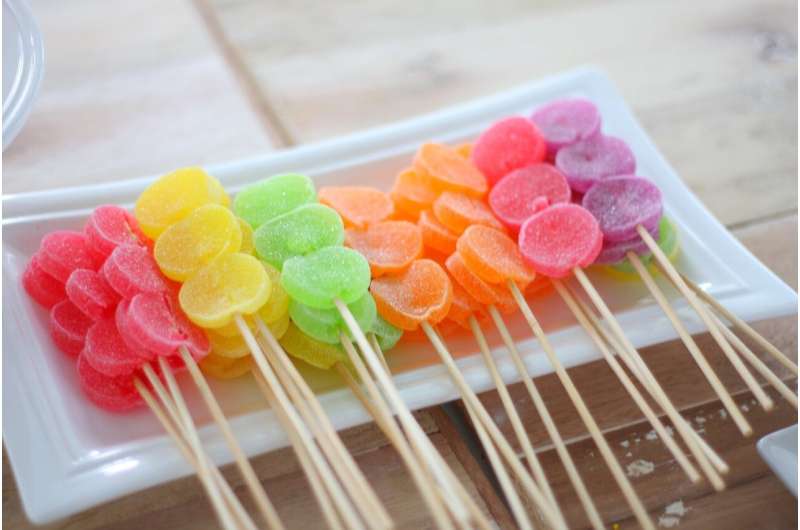This article has been reviewed according to Science X's editorial process and policies. Editors have highlighted the following attributes while ensuring the content's credibility:
fact-checked
peer-reviewed publication
trusted source
proofread
Scientists using novel hydrogel to create 'lollipops' for mouth cancer diagnostic

Researchers from the University of Birmingham, U.K., are creating a new 'lollipop' diagnostic for mouth cancer using a novel smart hydrogel.
Developed by Dr. Ruchi Gupta and colleagues from the School of Chemistry, the biocompatible hydrogel concentrates and labels proteins with a fluorescent marker in a single step, making it suitable for diagnostics that aim to detect low abundance proteins from small sample sizes.
The hydrogel achieves protein capture via the fluorescent marker (fluorescein isothiocyanate or FITC), which is attached to the hydrogel by a photocleavable bond. On exposure to light, the protein, which is now attached to the fluorescein, is released from the hydrogel.
Initial studies on the gel, published last year in Analyst showed the gel offered a concentration factor of 236 with a reference protein (streptavidin), and 50% of the proteins in the hydrogel were released after 100 seconds exposure to UV light.
Diagnostics are a new landscape for biogels, which until now have been used for drug delivery and tissue regeneration.
The gel developed by Dr. Gupta offers distinct benefits over existing diagnostic techniques. It has far fewer steps than ELISA-based assays or preconcentration using beads and electrophoresis and can be conducted at room temperature.
Cancer Research Horizon, the innovation engine built to complement Cancer Research UK's network, has filed a patent application for the novel hydrogel, and the Birmingham researchers are seeking collaborators or partners to develop further applications.
The gel's biocompatibility means the hydrogel can be used either in vitro or directly on patients, as with the current project, which aims to replace current invasive, time-consuming diagnostic procedures that need to be conducted by medical professionals.
Dr. Ruchi Gupta, Associate Professor of Biosensors at the University of Birmingham, said, "Smart hydrogels have really exciting potential for diagnosing mouth cancer. They can be easily molded into shapes as a solid to 'catch' proteins in saliva, and we're hoping that we can be the first to make a device which is much kinder for diagnosing mouth cancer for patients and easier for GPs to use.
"Beyond this project, we're keen to investigate other possibilities for the hydrogel, and will welcome approaches from research or commercial organizations who want to collaborate on research or commercialization."
More information: Leanne Kellermann et al, Photoactive hydrogels for pre-concentration, labelling, and controlled release of proteins, The Analyst (2023). DOI: 10.1039/D3AN00811H


















